We’re delighted to announce that Future Leap Consultancy has secured funding from the West of England Mayoral Combined Authority to deliver two cohorts of our acclaimed Skills Bootcamp on Sustainability in Business—a co-funded opportunity for professionals across the region to gain practical, actionable sustainability skills.
This initiative is part of the UK Government’s Skills for Life programme and contributes to the £11.3 million investment aimed at boosting skills across the West of England. It’s a powerful endorsement of the role sustainability plays in shaping resilient, future-ready businesses—and a recognition of Future Leap’s expertise in delivering high-impact training.
 What Is the Skills Bootcamp?
What Is the Skills Bootcamp?The Skills Bootcamp is a 10-week programme designed to help professionals integrate sustainability into their day jobs. Whether you’re in HR, marketing, finance, operations or procurement, this course equips you with:
All delivered by Future Leap’s network of expert consultants and changemakers.
We’ve already worked with teams at Pieminister, Lexus, Inside Travel Group, Priority Express, Gilcrest Manufacturing, Kelpi, Solutions for the Planet and Novotel—supporting them to embed sustainability into their operations and culture.
 Who It’s For
Who It’s ForThis Skills Bootcamp is ideal for:
 Programme Dates & Funding Options
Programme Dates & Funding OptionsWe’re enrolling for two upcoming cohorts:
The programme is:
Eligibility is open to those employed or self-employed in Bristol, Bath, North or North East Somerset, or South Gloucestershire.
 What Previous Learners Say
What Previous Learners Say“I’m a complete beginner and have found the sustainability space so overwhelming! This bootcamp has given me a real grounding in all the different topics, themes and nuances and having it broken down this way has been really helpful.”
— Becky, Starling Bank
“Despite having worked in this space for over 10 years, there’s always more to learn and it can be really hard to think differently about challenges you’ve known about for a really long time. It’s been great having people from different backgrounds and companies to hear their view and we’ve had some really interesting discussions.”
— Jen, Solutions for the Planet
These testimonials reflect the programme’s ability to support both newcomers and seasoned professionals in deepening their impact.
 Ready to Integrate Sustainability Into Your Day Job?
Ready to Integrate Sustainability Into Your Day Job?By registering your interest, a member of our team will be in touch to:
Spaces are limited and demand is high—don’t miss out.
Written by Theo Locke, this article has previously appeared on the ADLIB Blog.
Purplefish is a UK-based PR, communications and digital agency specialising in tech, property, and purpose-led organisations — including charities and not-for-profits.
In this blog, Purplefish shares their journey to becoming a B Corp, why certification was the right step for the business, and how it’s helping them drive positive impact for their clients, employees, and community, all while achieving the highest B Corp score in their region.
We are Purplefish – a UK PR, comms and digital agency specialising in tech, property and purpose-focused organisations – including not-for-profits and charities.
We offer insight-led communications and marketing campaigns. Our strong values-based ethos, which is reflected in our B Corp certification and employee ownership status, means we can offer clients a unique perspective that helps them stand out.
We have been a B Corp business since 2021 and we originally joined the movement because my personal view as the agency founder has always been that businesses should be run as a force for good and beyond the profit-focus that has traditionally been hard-baked into company structures.

The B Corp certification is an important, internationally recognised framework for us. It has become a kitemark for businesses which operate a triple bottom line of people, purpose and profit. Day-to-day, it’s a pragmatic way of keeping track of collective actions that we as a company have committed to. It helps us stay accountable in our mission to make a positive impact on the people we work with, our community and the environment.
It’s also great being part of a community of likeminded people and I have met some very inspiring individuals since we became a B Corp business.
We have just recertified and been awarded the highest B Corp score in our region – something which, as a team, we are all immensely proud of.
We started the process of certification during the pandemic. It was something I had wanted us to do for a long time before that but, as a small business, time and resource had always been barriers to committing to the process.
The whole assessment took about 6-8 months to complete in 2020 and then we achieved our certification in February 2021 with a score of 109.

Following the certification, it’s been good to have the rigour of doing an annual impact report, and since our certification, we have really been able to use it as a focus for ongoing continual improvements. The B Corp journey also led us to transition to an employee ownership model, which felt like the next step in our journey.
We have just recertified and that was also a significant amount of work, but very worthwhile as it looks across all aspects of the business.
Being a B Corp means we focus on these three areas and have specific targets for each, enabling us to track progress, which we do through a monthly team B Corp lunch meeting to ensure everyone in the team remains involved and included.
We are on the path to being a carbon-neutral business and we are proactively working to address the lack of diversity in our own industry. We also work together to volunteer for local causes and have a nominated charity each year. This year, it’s the Julian Trust that provides meals and beds to the homeless community.
We also provide pro bono services to organisations which would not ordinarily be able to use an agency and regularly engage with a broad range of community groups and initiatives to give advice talks. For example, we have a relationship with a local record label which promotes music of black origin to provide PR and social media advice to its emerging artists and trainee manager cohorts. We have also recently been involved with an initiative spearheaded by the Bristol Beacon to improve diversity in event management and production and are part of the annual Purposefest events for purpose-driven businesses.
Written by Theo Locke, this article has previously appeared on the ADLIB Blog.
We spoke with Alistair Paul, Director at Bright, a creative event production company specialising in employee engagement. With a focus on people and planet, Bright is now a certified B Corp, using events as a force for good.
Here, he shares their journey to certification, how the B Corp framework aligns with their values, and what it means for their team, clients, and the wider industry.
Bright is an event production & management company with a specialisation in internal and employee engagement events. We think differently about events, developing creative and insight-driven event solutions that tick all the boxes; on brand, on time and on budget. You can find out more about our approach on Bright’s website.
I found out about B Corp after seeing some other companies getting accredited, and so out of curiosity looked into what it was all about. Once I did, it was a no-brainer as the B Corp principles aligned with our values as a business and the ways we were already working.
For me it’s less that being a B Corp has changed what we do at Bright, but more it gives us the stamp of legitimacy to find other likeminded organisations and keep us on the right track. It also give our clients the confidence that they are working with a company that understands the impact events can have both on people and the planet.
The process was great, and to be honest I wish it had been around when Bright was set up because it really is a template for how businesses should be run if they want to build with purpose.
Being able to take it bit by bit rather than all in one go allowed us to work through our accreditation while also managing client projects, but I can’t stress the importance of having an internal champion. Someone who will take the lead and make sure it all gets done – for us that was the amazing Beth Simmons and I’m so grateful!
Internally, it’s something to unite with a clear vision and structure so that the team can be proud of where they work.
Before our B Corp journey we were already members of isla and Corporate Charity Partners for Caring in Bristol so we were already thinking about our impact socially & environmentally. The main internal change however is that being a B Corp means that we’re committed to measuring and reporting on this impact, so that we can continue to improve as we grow.
Externally, it allows us to advocate for a fairer and more sustainable events industry, and hopefully find and attract like minded partners at every part of the event production process from suppliers and venues to clients themselves.
Reading Room is proud to announce that it has been granted a Royal Warrant by His Majesty The King as Suppliers of Website Development and Management Services. This is a mark of recognition for the services we provide to the Royal Household reflecting our long-standing relationship which is still ongoing today.
The granting of a Royal Warrant reflects Reading Room’s commitment to maintaining digital services with the highest standards of quality, security, service, and reliability. The Royal Warrant is a prestigious acknowledgment, awarded to companies and individuals who have regularly supplied goods or services to the Royal Household for at least five years.
Speaking about the recognition, Polly Lygoe, Managing Director of Reading Room, said:
“We are honoured to receive this Royal Warrant for our digital and website services. It represents a testament to the skill, dedication, and professionalism of our team. We are proud to continue supporting our clients with the same high standards that have earned us this recognition.”
Reading Room joins a select group of businesses that meet the high standards required by the Royal Household. The Royal Warrant is a well-respected mark of recognition and is held in high esteem both in the United Kingdom and internationally.
Reading Room remains committed to upholding the traditions of excellence and discretion that are associated with a Royal Warrant.
For further information about Reading Room’s digital services, please visit www.readingroom.com.
Standard benefits packages won’t cut it for Gen Z. Here’s how they’re raising the bar and what you can do to meet it in 3 easy ways.
The generation that won’t settle for more of the same. Gen Z is here and they’re changing the game.
Born between 1997 and 2012, they’ve grown up digital, purpose-driven, and ready to challenge how work works. By the end of 2025, they’ll make up a quarter of the global workforce
And here’s the thing: standard benefits packages aren’t cutting it anymore.
If you want to attract, engage, and retain Gen Z talent, you’ll need a benefits experience that feels as personal, digital, and values led as they are. So being part of the Bristol Creative’s network let’s explore how this generation is raising the bar for benefits and what you can do to meet it.
Firstly, digital Natives Expect Digital-First Benefits! Gen Z grew up with smartphones, social feeds, and instant everything. So, when they join your workforce, they expect the same seamless experience from your benefits. A company’s tech influences whether they want to work there. They expect business tools to be as intuitive as TikTok and as mobile-friendly as their banking apps. If your benefits platform feels clunky or old-school? You’ll lose them before they’ve even logged in.
Secondly, they care deeply about purpose. For Gen Z, work isn’t just a job. It’s a platform for impact. Often, purpose at work matters more than a pay cheque. If your benefits don’t reflect your social and environmental commitments, you’re missing a massive engagement driver.
Then there’s the whole avenue called “flexibility”. Gen Z doesn’t measure success by hours logged. They care about outcomes and flexibility of schedules. In addition, there’s flexibility with regards to personalised benefits which I have mentioned numerous times. Forget biscuit-cutter packages. Gen Z expects choice: mental health support (which is non-negotiable being essential not optional), help their sustainability goals/carbon footprint, help with student loan repayments, help with community impact…all good examples.
Why? Well, it’s not rocket science – lower turnover, higher engagement and it makes you stand out in the crowd as an employer.
Gen Z is raising the bar for what great benefits look like. If you’re still offering one-size-fits-all packages, you’re missing a huge opportunity to engage the workforce of tomorrow.
If nothing else just look at
Because if your benefits aren’t easy to access, easy to understand, and easy to love, they aren’t working hard enough.
A couple of weeks back was Earth Day, and the 2025 theme is Our Power, Our Planet. This year, the Earth Day movement is uniting the globe around renewable energy to help us achieve ‘triple clean energy’ by 2030. Sustainability is at the heart of Bristol Creatives and as a community we should constantly strive to innovate and provide eco-friendly employee benefits.
But where do you start? Well, here’s a few pointers to embed sustainable and eco-friendly employee benefits into your business.
With CSR strategies becoming a must-have, companies are coming forward en masse to share their green credentials, giving birth to the term “Greenwashing”, where organisations talk the talk but don’t walk the walk when it comes to employee wellbeing practices. The same is true with greenwashing, but the scrutiny is even higher. If you make a claim about your environmental commitments, you must have the data to back it up. Without the data, it’s simply talk, and you’re at risk of being seen by your clients, consumers, and partners as greenwashing.
Clients and employees increasingly seek businesses that do good environmentally and socially, but they will also want to see the proof. Being branded a greenwasher will harm your reputation among employees, clients and partners, and you could find yourself in court.
So, how do you get CSR right? What are eco-friendly business practices?
There’s a long list of ways you can embed sustainability into your business through eco-friendly benefits and ways of working. Employees want to work for a business that authentically demonstrates ethical behaviours, and they’re scrutinising your corporate social responsibility policy alongside your Employee Value Proposition (EVP). Conscious quitting is a growing trend among socially conscious employees seeking equally socially conscious employers who contribute to the communities and environment in which they exist. By 2025, Millennials will make up nearly three quarters of the global workforce, and they’re looking for socially responsible employers.
Climate anxiety is real, especially among the younger generations, and these are the people who will make up the future workforce. Research tells us that young people don’t think the government is doing enough to avoid a climate crisis and expect their employers to act responsibly.
How can business’s embrace sustainable business practices through eco-friendly employee benefits. How about helping employee’s retro fit their homes…double bonus of improved financial wellbeing with energy bill savings and improvements in sustainability?
You can’t discuss eco-friendly employee benefits without stepping into the world of green car and cycle to work schemes. Both encourage greener ways of commuting to work, whether by an electric vehicle or bike and bring tax and NIC savings to employers and employees. Greener commuting and money back in your pocket! The more employees who take up a salary sacrifice scheme within your business, the more you’ll save on National Insurance Contributions. Cycling promotes physical wellbeing, and healthy people have less sickness absence = another saving to your outgoings. Your employees’ finances also benefit from a reduction in the taxable element of their payslips.
Cycling may not be feasible for those travelling long distances, but with your support, they can still make their commute greener. Offer your employees a salary sacrifice car scheme to create tax savings and make low-emission travel more affordable.
How about considering CSR Partnerships? Embedding paid volunteering opportunities into your strategy boosts morale, social value, and engagement. There are clear benefits to the business, such as being more attractive to potential partners and customers, but it isn’t without cost. Whenever you pay for a person to be out of the business, you’re funding time that’s essentially non-productive from a business output perspective.
Still, most employees think their employers should incorporate paid volunteering days as an employee benefit, claiming it allows them to learn new skills they can bring back to the business. There are employee benefit providers that allow employee to access even more volunteering opportunities within their local communities and is proving incredibly popular – a definite morale booster!
Post COVID flexibility in contracts is becoming the norm, which is excellent because they’re in demand. There are also measurable business benefits, such as a high increase in productivity. Offering flexible, hybrid, and remote contracts helps talent acquisition and retention, with two thirds of job seekers claiming they’d reject a role that didn’t offer flexibility. The more flexible you are as an employer, the more you support your employees in finding a healthy work-life balance, which will increase employee engagement levels.
From a sustainable business practices perspective, there are additional benefits to having a hybrid workforce including lower fuel and energy usage within the office and fewer employees driving to the office means lower emissions that you can chart against your climate or social value pledge.
In a time where hybrid or fully remote working is becoming increasingly more common, it is really important to be able to make the most of your work environment. Sitting at your desk all day may seem like the best way to complete all of your tasks for the day, but there is only so long a human can focus before productivity begins to take a nose-dive. There are lots of small, easy changes you can make to your working day in order to ensure you are as motivated and productive as you can be, whilst still looking after your wellbeing. Here are our 5 favourite tips for increasing productivity at your desk!
Sounds counter-intuitive doesn’t it? Well, plenty of studies have shown that taking regular breaks away from your desk increase your productivity when you are back at your desk. Give your mind a break from your workload by taking a walk, grabbing a coffee or just getting some fresh air, which is proven to massively increase focus.
It is really important to stay hydrated, both in and out of the office. Increased water consumption improves energy levels and the quality of your sleep, both of which will have an impact on the quality and speed at which you complete your work. Whilst a cup of tea or coffee will aid rehydration, it is a good idea to keep a bottle of water at your desk so that you can drink throughout the day.
Think about what motivates or inspires you, without distracting you. Studies have shown that having pictures of loved ones, plants or other small personal belongings provide a quick mood boost and can increase focus. Ensuring your desk space is personalised to you but not cluttered is a good way to make the workday run a little smoother. Staying on top of organisation and storage also reduces the time you’ll spend hunting for that file or favourite pen, which can lead to further distractions!
If your to-do list is seemingly never-ending, it’s easy to feel demotivated and like you aren’t actually achieving anything. Breaking down big jobs in to smaller, more manageable tasks creates an easy plan to follow, as well as a huge feeling of accomplishment when you complete everything on your list for that day. Setting yourself smaller goals for the day mean you don’t feel overwhelmed, and you might find yourself surpassing your targets, which will further add to your sense of achievement.
So you’ve tried everything, been for a walk, had some water, looked at your office plants, but your workload still seems to be increasing and you can’t seem to get going? Talk to your co-workers, or the other people in your office, whether it’s on zoom, email, or face to face, the chances are that if you are experiencing a dip in productivity, they may be able to help. Either by reminding you of what the end goal is for your task or project, or by helping you manage some of your workload, the people around you are all part of your support network, and being able to engage with and offer assistance to your colleagues can have a feel-good effect on you as well.
For more great tips or resources that help increase productivity in the workplace, we like SnackNation’s blog: 34 Ways To Be More Productive At Work
Wellbeing matters and is THE core key feature within any employee benefits package.
Wellbeing (noun) Definition: A good or satisfactory condition of existence; a state characterised by health, happiness, and prosperity.
We know that employee happiness and wellbeing are directly linked to the benefits they receive. Employees who feel valued and happy at work are more productive and effective in their roles. Additionally, organisations that provide appropriate benefits to support employee wellbeing are more likely to foster engaged and high-performing teams.
In today’s fast-paced, competitive corporate world, prioritising employee wellbeing is no longer a perk, but a necessity.
But why does employee wellbeing matter?
Employee wellbeing goes beyond physical health, it also includes mental, emotional, and financial wellness. Employers who invest in the wellbeing of their workforce not only meet their Duty of Care obligations but also create a positive workplace culture. This results in higher retention levels and enhanced productivity.
According to latest research, 82% businesses have seen their employees demanding more wellbeing benefits, with 56% of employees saying that they would leave their job if another company offered them a better benefits package. In addition, it’s widely recognised the need for benefits packages to address unprecedented employee stress levels causing burnout, decreased engagement, and higher absenteeism, highlighting how great wellbeing and benefits are not just good for employees; they are good for business.
Tangible benefits, especially those with high (perceived) value, can significantly boost employee morale and fulfilment. There is a lot of noise now for electric vehicles supplied as an employee benefit. A brand-new car, for example, is more than just a mode of transport, it’s a symbol of appreciation, recognition and support from an employer. Car benefit schemes not only signify support and recognition to employees, elevating job satisfaction and motivation but they also host several other perks that boost workplace wellbeing and engagement levels. One benefit of the scheme to employee wellbeing is financial peace of mind. Employees don’t need to worry about car loans, credit checks or deposits. A fixed monthly reduction from their salary covers it all- insurance, tyres, VED, servicing, and even breakdown cover.
Sustainable benefits have become vital to the wellbeing of a large proportion of employees in recent years, particularly Gen Z and Millennials. Offering environmentally conscious benefits, like EV schemes, helps promote a sustainable culture that aligns with employee’s values. As an added benefit, it also supports corporate social responsibility (CSR) goals.
March is B Corp Month, which celebrates businesses that have achieved certified B Corporation status, a measure of high standards of social and environmental performance, transparency, and accountability.
Our region has many B Corps. In fact, a report in 2023 said Bristol is home to the most B Corps of any UK city outside of London.
To mark B Corp Month 2025, we put a call out to B Corps in the Bristol Creative Industries community and had a great response. Read about inspiring businesses below, with their tips for how to become a certified B Corporation.
“My biggest piece of advice for businesses considering B Corp certification? Just start! The process may seem intense at first, but once you take that first step, it all becomes much more manageable. The B Impact Assessment gives you a clear benchmark, and it’s quicker to work through than you might think. More importantly, see it as a journey. Every step you take is a step towards becoming a better business for both people and the planet. By simply starting, you’re already making a positive impact!”
Tom Locke, Noughts & Ones (BCI member profile | B Corp profile)
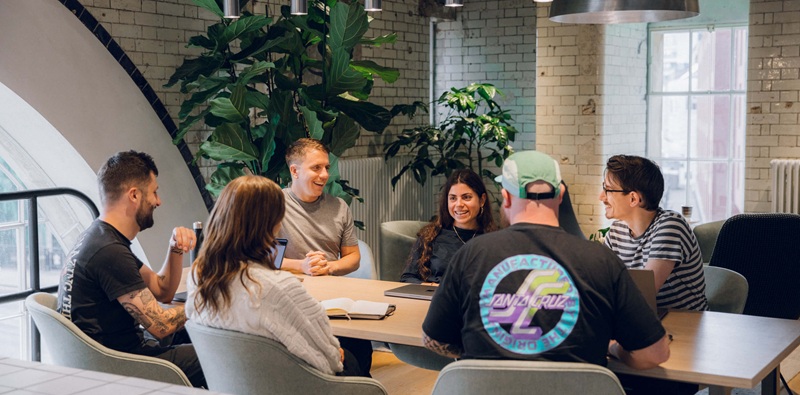
“To become a successful B Corp focus on embedding sustainability deeply within your company culture. Start by clearly assessing your environmental impact. For example, Atomic Smash made a big step by transitioning a majority of clients’ hosting to providers that solely use renewable energy and prioritising greener digital practices. Regularly evaluate your performance through the B Impact Assessment, ensuring continuous improvement. By transparently integrating these purposeful practices into daily operations and clearly communicating your efforts, your business can successfully attain B Corp status and inspire positive change.”
David Darke, Atomic Smash (BCI profile | B Corp profile)
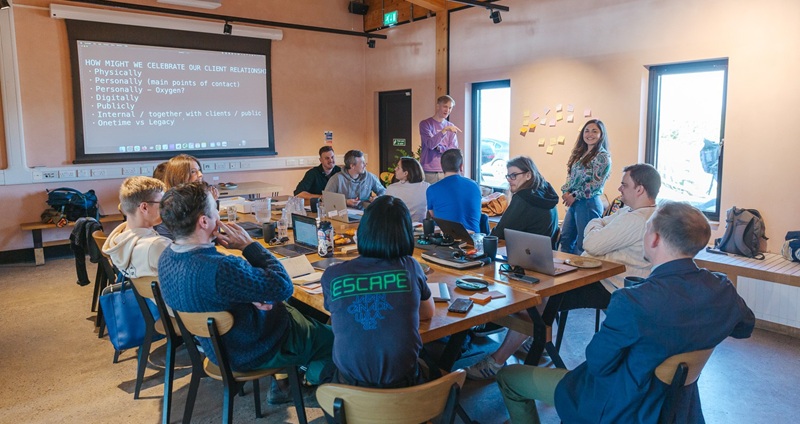
“One of the key tips about becoming a B Corp is that you don’t just become one and tick it off your list. Achieving B Corp certification is just the start of the journey. It’s about a wholehearted commitment from the top to the bottom of your organisation to do better business. It affects everything – from Articles of Association and company mission, to choice of suppliers, clients, company policies and so on. No business is perfect, but the B Corp assessment criteria help to set priorities and objectives towards meaningful change so that people and planet are considered equally alongside profit. It’s a huge commitment, but for us, there’s no other way to do business.”
Alex Ririe, The Collaborators (BCI profile | B Corp profile)
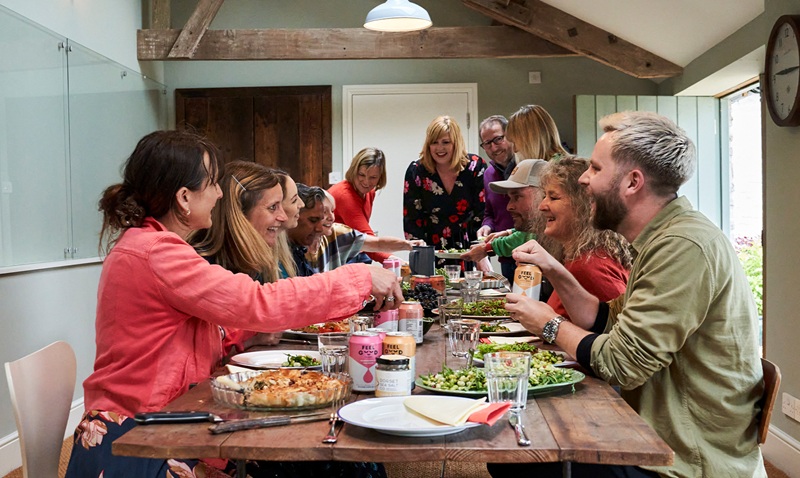
“Halo was one of the first 1,000 businesses in the UK to become a certified B Corp.
“Becoming a B Corp challenges you to focus on areas often overlooked and helps focus your business into a force for good. There is a lot to do, so I’d say start small—review suppliers, refine policies, and engage employees by letting them choose causes they’re passionate about. Keep it on the leadership agenda, talk and learn from other B Corps.
“The process is about continuous improvement, ensuring accountability and impact. Going green doesn’t mean an overhaul; think local, reduce waste, and measure your footprint- we plant a tree for every invoice we raise. The biggest tip? Just get going.”
Nina Edmonds, Halo (BCI profile | B Corp profile)

“Our mission is to shape an industry where paid media done the right way delivers client success whilst contributing to stronger communities and a healthier planet.
“This clearly aligns with the B Corp values and the accreditation has helped us focus on how we can expand our purpose.
“We had a mentor, Business on Purpose founder Andy Hawkins, to guide us through the process, which was very helpful. The B Corp community is a valuable one in which working collaboratively is at its core. If you are not sure whether to proceed with the accreditation, feel free to reach out to us (or any other friendly B Corp) and we’ll be happy to answer any questions.”
Toby Parkins, The Nest Media (BCI profile | B Corp profile)
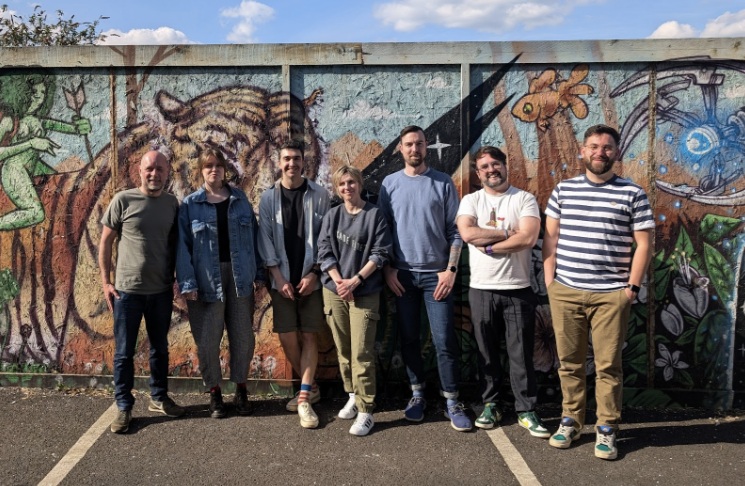
“Our mission is to create work that has a positive impact on people and planet, so becoming a B Corp felt like a natural step.
“Our tip is to really make sure that your people are on board with what you’re trying to achieve. B Corp certification isn’t something that a couple of people within the organisation can be solely responsible for. It’s down to everyone playing an active role – from committing to volunteering days to understanding what reproductive policies look like in our agency.
“We take regular opportunities to share what we’re working towards and invite feedback from teams across the business, which is so far proving successful.”
Sarah Dennis, Aer Studios (BCI profile | B Corp profile)
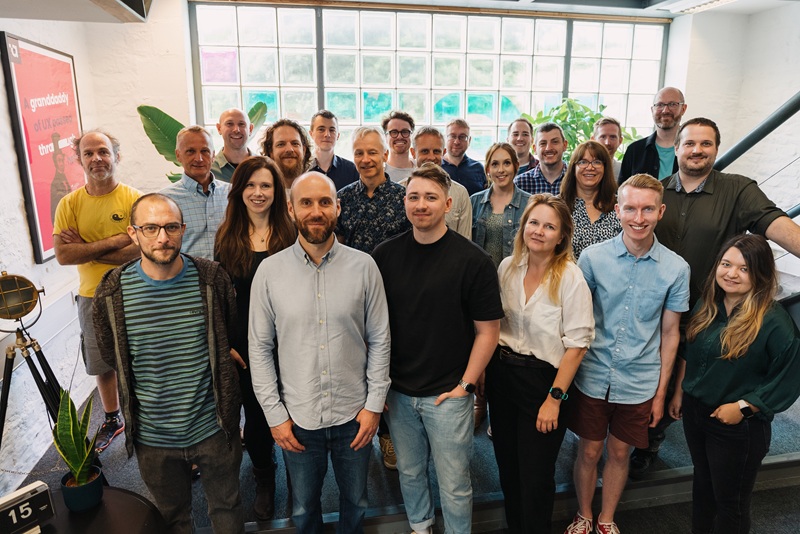
“Becoming a B Corp isn’t just about ticking boxes; it’s about weaving purpose into your business’s DNA. It starts with a genuine commitment to people, clients, the community, and the planet. Prioritise ethical practices, transparency, and accountability.
“Continuous improvement is key; small, meaningful changes create a lasting impact. Use your business as a force for good, challenge the status quo, and resist pressures that push against positive change. The journey to certification is a mindset shift, not just a process. When you do it for the right reasons, everything else falls into place.”
Josh Harrison, Taxi Studio (BCI profile | B Corp profile)
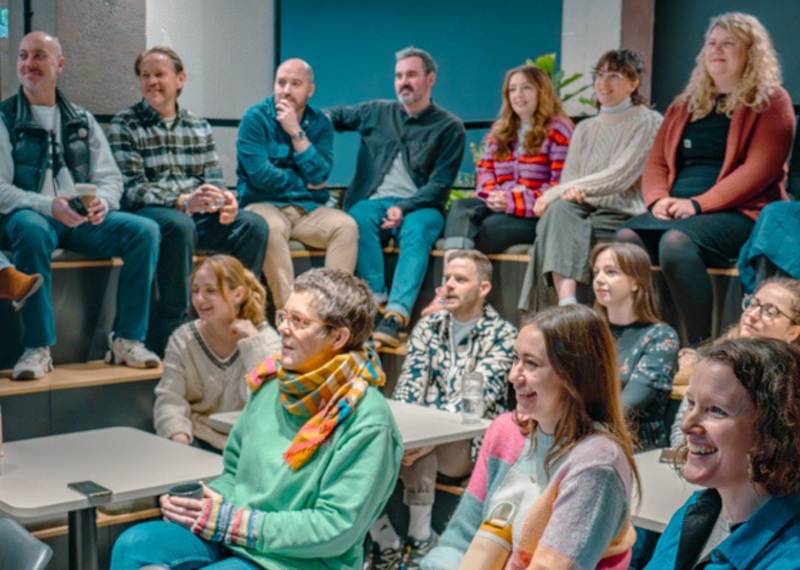
“First and foremost, you have to truly want to do it. When Something Familiar began our B Corp journey, it was because we wanted to wear our values on our sleeve and embed good practices from the start – ensuring our business grows in alignment with our principles.
“The process is rigorous and constantly evolving, but that’s the point. We started by being honest about where we were, then committed to change, growth, and improvement. It’s not just about policies, it’s about embedding impact into every decision.
“The benefits are super clear too, we’ve forged stronger relationships, engaged teams, and built long-term sustainability. If you’re considering starting your journey, the B Corp community is incredibly open and supportive, ready to guide you along the way.”
Rich Williams, Something Familiar (BCI profile | B Corp profile)
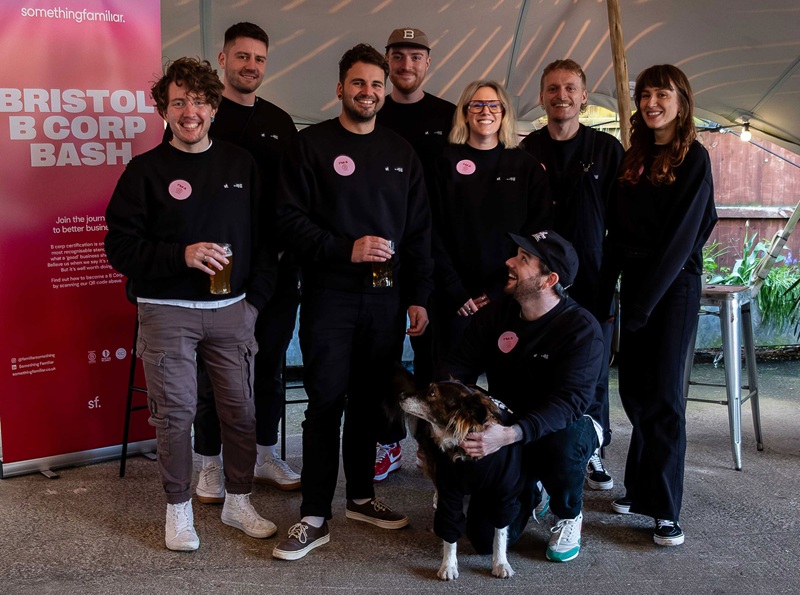
“Becoming a B Corp isn’t just about earning the certification, it’s about committing to continuous improvement in how your business operates. By embedding its principles into your company culture, you will ensure your team understands and embraces the commitment.
“From producing an annual impact report to recertifying every three years, B Corp principles should be woven into the fabric of your business, not forgotten once the plaque is on the wall. Tracking progress and gathering evidence are key to this. At our company, we hold a monthly B Corp team lunch to review each pillar and share updates. Certification isn’t the finish line–it’s the start of an ongoing journey to balance profit with purpose and drive meaningful impact.”
Lucy McKerron, Purplefish PR (BCI profile | B Corp profile)
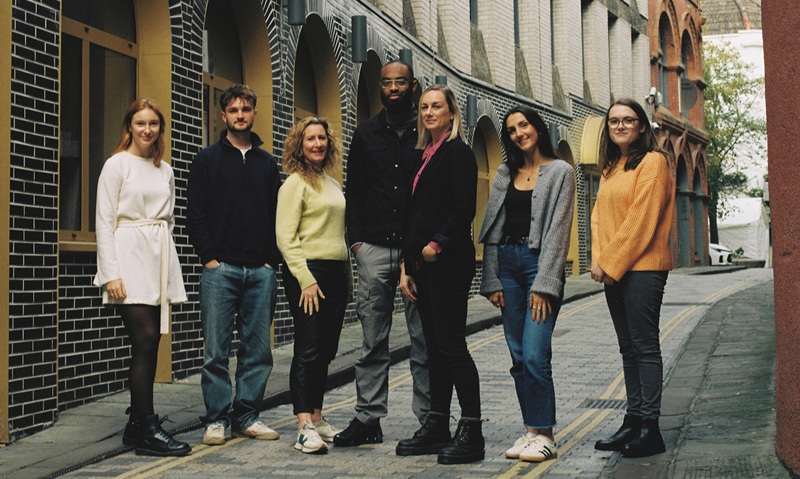
“Give yourself plenty of time. Use the Impact Assessment questions to inform and guide your company policies and business practices before deciding to go for certification, so that the core values of B Corp are already embedded into your culture.
“Learn from others who have been through it but if you can, engage a consultant. We were guided through the process by Byen which made the whole experience very enjoyable.
“Be thorough and meticulous. Continually record and build your evidence to simplify the submission stage.
“Look for easy wins – small changes can have a big impact.
“If you have been honest and evidenced everything, you can be confident of your score when you submit.”
Alexia Mihranian, Osborne Pike (BCI profile | B Corp profile)
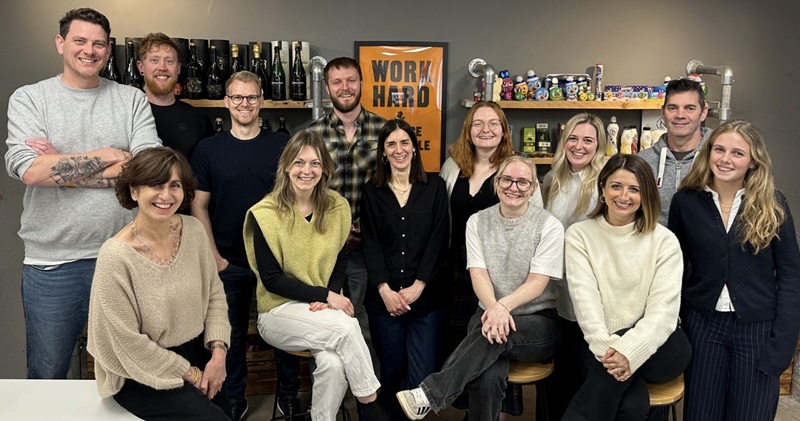
Be authentic
You should become a B Corp because you believe in the philosophy, not because it’ll benefit you, so do it for the right reasons and focus on initiatives that make a real difference to your team, your community and the world around you.
Focus on the Three Ps
People, Purpose and Planet are the cornerstones of being a B Corp. Get those right then in turn it will benefit your Profit.
Build B Corp into your culture
It takes time and energy to live your B Corp values. Embed purposeful initiatives into your company culture and objectives to stay focused and on track.
Make friends
It’s easier (and more impactful) to make a difference if you do so with others! Find your local B Corp community and make partnerships with like-minded businesses around you.
Be adaptable
What it means to be a B Corp changes with the times, so be adaptable to new landscapes within society and the planet as a whole.
Amy Stobie, AgencyUK (BCI profile | B Corp profile)
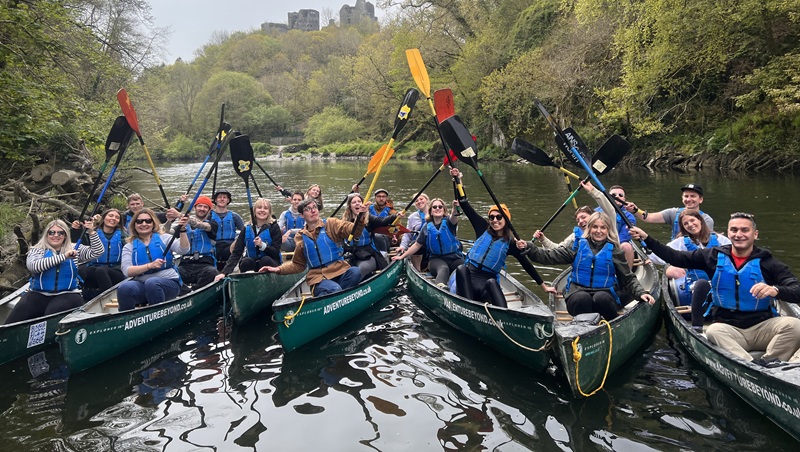
“Becoming a certified B Corp was a proud milestone for us at Rhombus.
“My advice? Don’t treat it like a side project. Make it part of how you do things, day to day.
“Get your team involved early, be honest about where you’re falling short and see it as a chance to improve, not just to certify.
“The process can feel heavy at times, but it brings real clarity. For us, it’s helped sharpen our purpose, hold ourselves to a higher standard and shape the kind of clients and collaborators we want to work with. Worth every spreadsheet (and late night!)”
James Ratcliffe, Rhombus (BCI profile | B Corp profile)
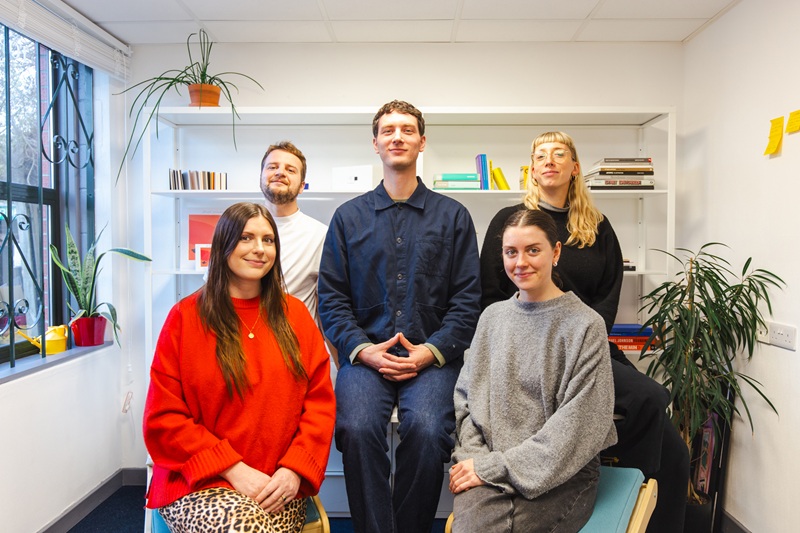
“Going through the process of becoming a B Corp is a little like eating the proverbial elephant – you have to do it one bite at a time.
“It is a big task, but by breaking it down you can make a plan that works with your resources. Try to get as many of your team involved as you can, not only to share the workload but to ensure everyone is on board and actively participating in the process. And don’t forget the wider B Corp community, including B Leaders, who are on hand to answer questions when you get stuck.”
Rin Hamburgh, Rin Hamburgh & Co (BCI profile | B Corp profile)
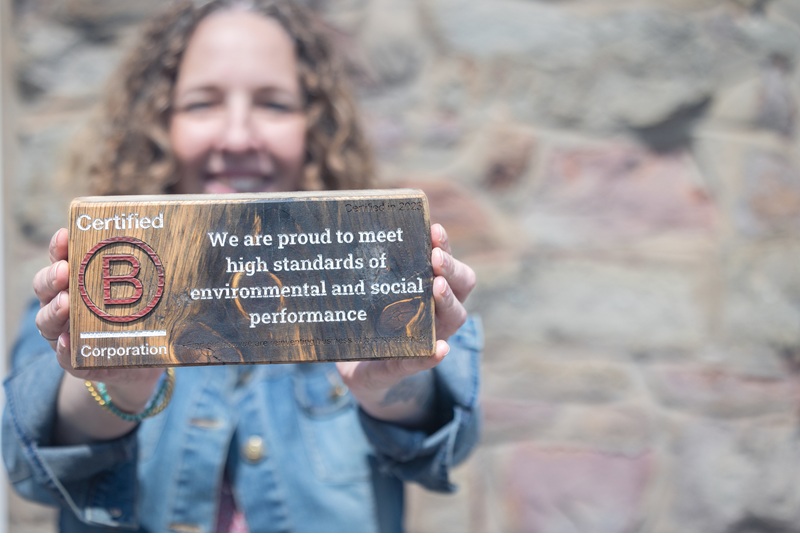
“The best way to become a B Corp is by not taking it as a set of requirements, but genuinely using them as principles to guide yourself as a business.
“Especially with the upcoming changes, becoming certified is a lot harder if you consider it as the minimum bar to jump. By thinking genuinely about the impact you can and want to make that aligns with who you are as a business it’s far easier to get everyone on board and embed B Corp into your culture, which in turn, makes the accreditation easier too.”
Alistair Paul, Bright (BCI profile | B Corp profile)

“We started our B Corp journey in 2018 and certified in 2019.
“The more we heard about it the more aligned we felt with it and that it gave us a framework to work towards and ultimately the recognition that we were running the company in the right way.
“The key thing is identifying where you feel as a company you can make a meaningful difference across the five core areas assessed. It’s important everyone has a voice and that you are all working towards the same goals you want to achieve.”
Steve Kay, ADLIB (BCI profile | B Corp profile)
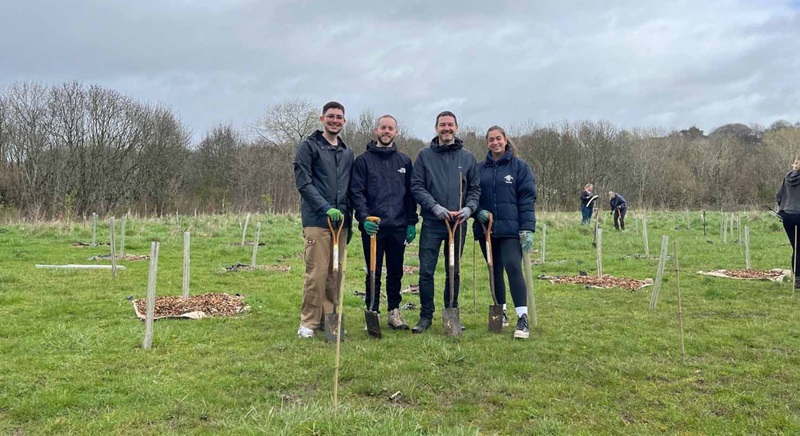
“I’d suggest working through the Business Impact Assessment one section at a time. And take your time. Chip away at tasks little and often to make steady progress. Try to set aside dedicated time each week to move forward.
“Share the workload with your team, so you don’t feel overwhelmed. It’s also important that the process feels authentic. Ideally, you’ll find that many of the policies, procedures, or at least values, are already in place in your company. So going B Corp feels natural and genuine, like the next step in your journey.”
Jess Evans, Shaped By (BCI profile | B Corp profile)
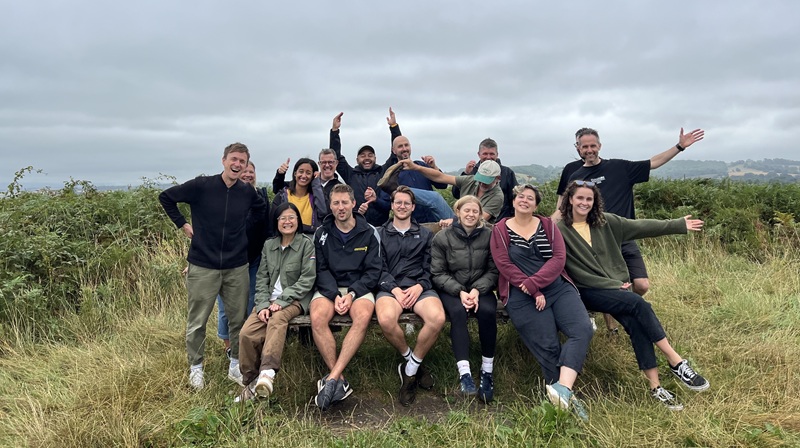
“Becoming a B Corp is a transformative journey that reshapes your business around core values centred on people, planet and purpose. At ORCA, these principles have always guided our work, and certification has only strengthened our commitment.
“This process impacts every part of your business, so involve your entire team from the start. Define clear roles and responsibilities to ensure that everyone contributes to the initiatives that drive sustainable change. Embedding these values into daily operations is key, and tapping into the B Corp community for insights and best practices provides invaluable support, reinforcing your mission and driving continuous growth.”
Mila Embury, ORCA (BCI profile | B Corp profile)
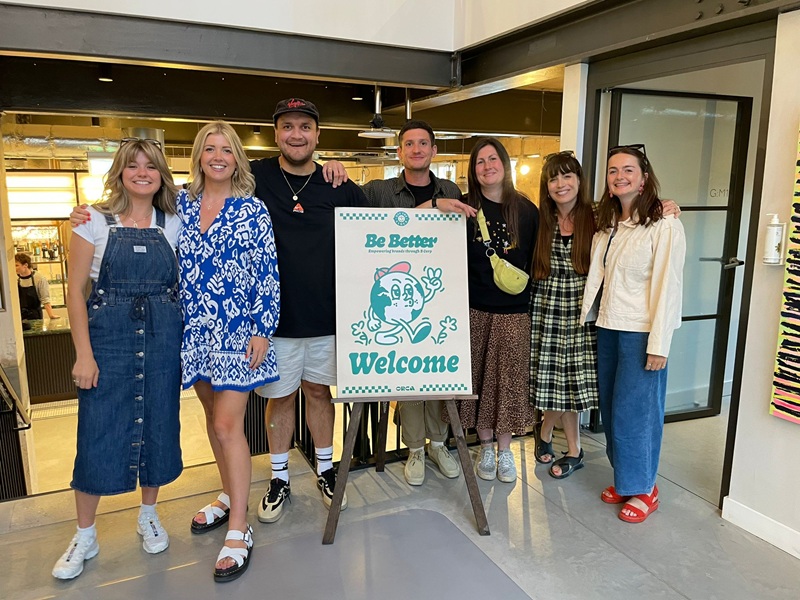
“Get support and carve out time:
“In terms of the application itself, we found some of the questions quite jargon-heavy. So we found it really useful to work with someone who had been through the process who could clarify what sort of information the question needed as a response.
“Having support from an external party also kept us accountable for hitting deadlines around filling in the application. We set aside one day a week during the application process.
“Involve your team:
“It’s impossible for one or two people to do everything. We found that involving the team helped to share some of the responsibilities, as well as adding an element of team-building and fun to the process.”
Karen Pearce, Loom Digital (BCI profile | B Corp profile)
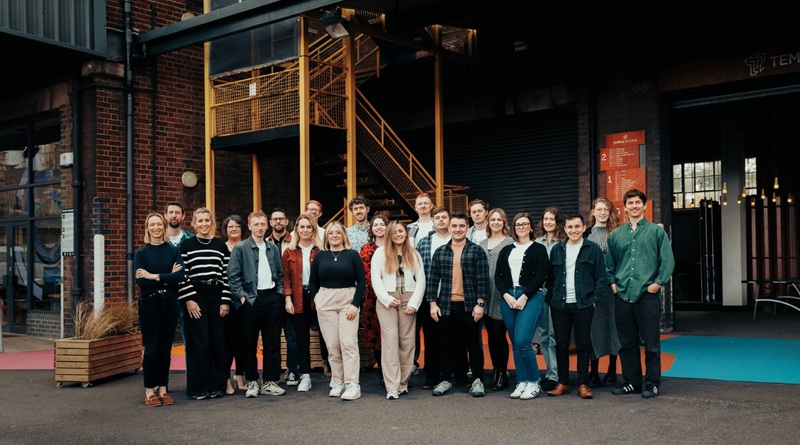
“Becoming a B Corp is just the beginning. Since certification, we’ve partnered with local B Corps to amplify our collective impact.
“We’ve focused on reducing energy consumption by installing new windows. Volunteering with charities like Bristol Zoo Project and St Peter’s Hospice has engaged our team and connected us more deeply to the local community.
“The quickest win? Switching to eco-friendly alternatives like CoCo+ for business travel and Ecosia, the greenest search engine on the planet. It’s the small, habitual changes that make a lasting difference in creating a more sustainable future.”
Lottie Pratt, saintnicks (BCI profile | B Corp profile)
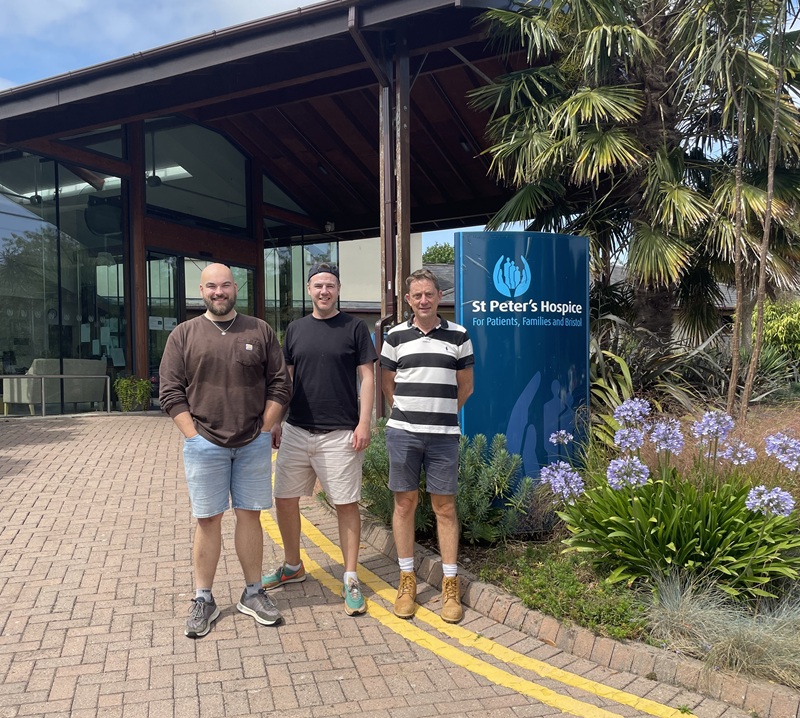
“Being a B Corp is a commitment to ongoing positive change rather than a one-time achievement, a journey rather than a destination to tick off.
“What’s worked for us has been small but regular sustainable changes: changes that can be more easily embedded into business processes, adopted by everyone in the business and built on each year.
“Certification is truly a team endeavour but, practically, it helps to have one project leader to coordinate stakeholders and drive progress.”
Belle Farman, Sunhouse Creative (BCI profile | B Corp profile)
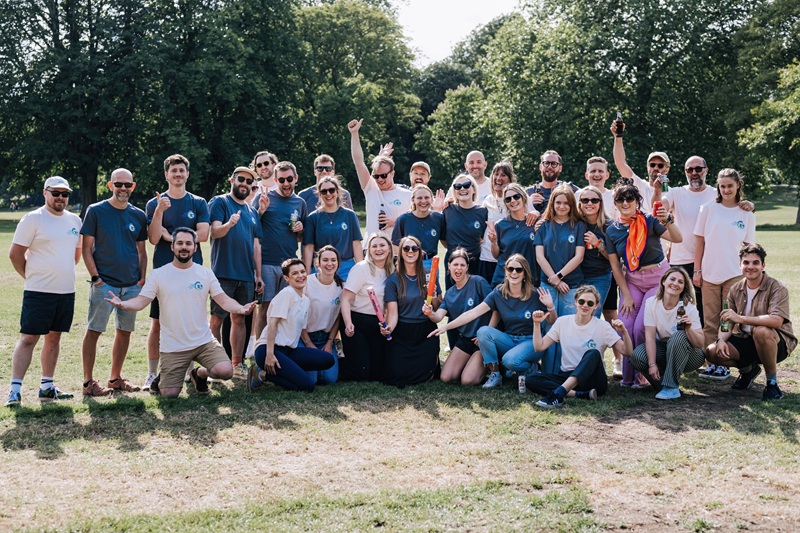
“For us the best advice we can give on how to successfully become a B Corp is simply to do it for the right reasons. If the B Corp set up is right for the values and direction of your business then it’s a no brainer. If however it’s primary use is that of a tool for sales, then reconsider. We’ve noted many controversial and immoral uses of the B logo by organisations hoping it’s a route to easy wins.
“The process of certification was a wonderful and thorough thing for us. It helped us ask questions of ourselves we wouldn’t have normally, set our business on a course for the foreseeable, and helped our team unite under clear and positive values. So our advice would be to enjoy the process with an open and honest mind. Even without certification you will take value from the process.”
Adam Millbank, JonesMillbank (BCI profile | B Corp profile)
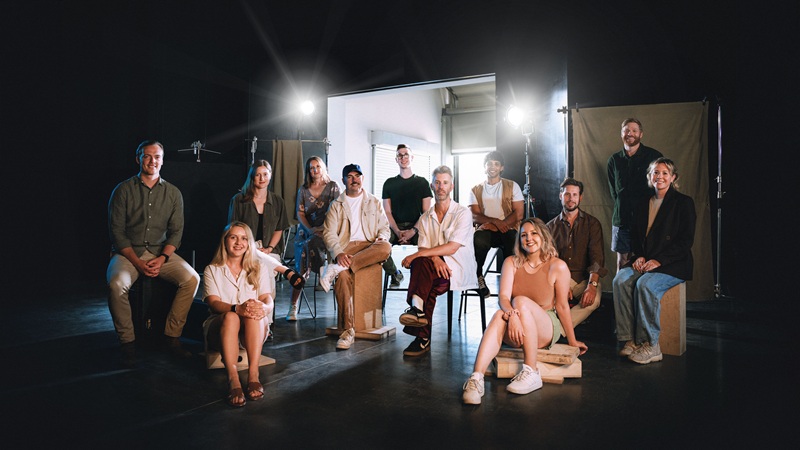
“Becoming a B Corp back in 2022 was a real turning point for us at Skylark. The B Impact Assessment helped us dig into what we were already doing well and where we needed to step up – across governance, team, environment and community.
“My advice? Don’t wait until everything’s perfect – just get started. The Impact Assessment is famously a journey, and with good reason. You’re interrogating every facet of your business.
“In uncertain times, when businesses face economic pressures and competing priorities, it’s easy to let purpose take a back seat. But it’s exactly when people, planet, and integrity are at risk that we need values-led leadership the most.”
Nina Postans, Skylark Media (BCI profile | B Corp profile)
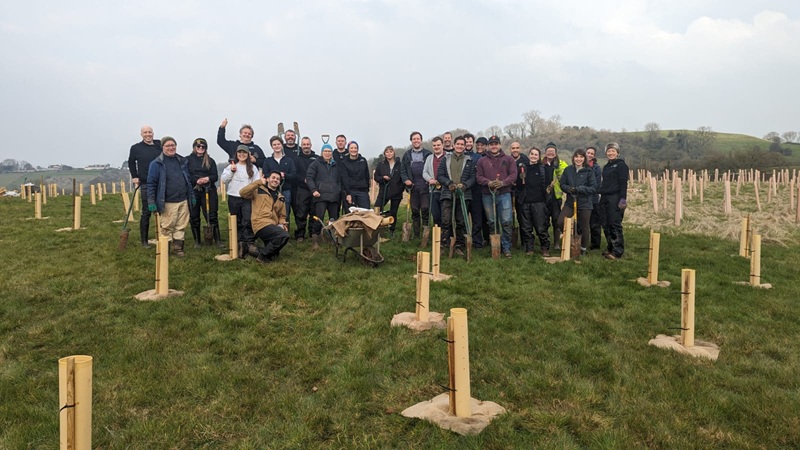
“Mustard is a Bristol based creative industry recruiter. We started our B Corp journey in September 2023 and we had confirmation of our acceptance in May 2024.
“We were looking for something that people in the business could get behind to increase the “purpose” in their role. We initially shied away from B Corp but when we went to a Bristol meet up and spoke to some people we realised that B-corp was actually it!
“We used an external advisor, the ubiquitous Andy Hawkins, who was a great help in just breaking down things that sound ominous into things that become very achievable. What we found was that we already did a lot of the stuff and that spurred us on to get that confirmation from an external organisation that we were a well-run business who gives a sh**!”
Peter Browne, Mustard (BCI profile | B Corp profile)
“Involve your team right from the start of your B Corp journey as you can’t do it alone.
“We needed to establish what was important to us and creating a culture where everyone is heard and can contribute means your B Corp statement is authentic and owned.
“We also would recommend being transparent, while creativity can be a force for good we also needed to be upfront with the sectors that we work in that can be playing catch up as they navigate change in sustainability.”
Ruth Clarke, Six (BCI profile | B Corp profile)
As we settle into 2025, the ongoing cost of living crisis and economic volatility continue to strain both employees and employers, with many employees facing heightened financial insecurity.
So how can you optimise your benefits budget without cutting value? The first step is to discover how to reallocate wasted spend, secure better pricing, and leverage tax-efficient benefits to maximise impact.
Managing employee benefits, cost control is always on the agenda. But savings don’t have to come at the expense of employee experience. With a smart approach to benefits design, companies can reallocate wasted spend to more impactful benefits – or a better benefits platform to help you manage it all. This makes the most of your existing budget while boosting value for employees.
This practice is sometimes referred to as “cost-neutral benefits,” but the reality is more nuanced. While some companies can identify and redistribute significant savings, others may already be optimising their spend. Either way, a strategic review of benefits is always worth the effort.
Here are three key ways employers can find opportunities to optimise their benefits budget:
A common mistake? Investing in benefits that employees don’t value. Recent key research tells us that there is low appreciation levels from employees for their benefits.
The cause is likely to be benefits that don’t align with employee needs.
For example, a Bristol Creatives startup made up of mostly employees in their twenties might be overfunding its life insurance policy, as employees in this age group are less likely to engage with life insurance. By scaling back the coverage from 10x to 2x cover, they could free up a big chunk of their spend—money that could be reinvested in wider range of more relevant benefits, or a platform that helps manage the administrative burden of benefits.
So how can Business Leaders identify these opportunities?
But before you go cutting less utilised benefits, remember: there are some benefits that few employees might use, but that are highly valuable and even life changing to them when they do, such as reproductive assistance or critical illness cover. It’s important to balance these factors when assessing your benefits. Speaking to a benefits design expert will be your best bet to strike that balance.
Cost savings aren’t just about what you offer, but also how you fund it. Many companies lose money by not negotiating the best rates with insurers or missing out on more efficient financial structures.Here are some key ways to make the most of funding:
By optimising financial structures, companies can often unlock significant savings without compromising on benefits quality.
3. Leverage tax-efficient benefits
Another overlooked opportunity is tax-efficient benefits, particularly salary sacrifice schemes. These allow employees to exchange part of their salary for benefits, reducing both employer and employee tax contributions.For employers, this means that you’re able to offer amazing benefits like electric vehicle leasing schemes and even grocery schemes…at no cost to you!
In the UK, salary sacrifice arrangements can create savings on:
For employers not already leveraging these benefits, the savings can be substantial, especially on National Insurance contributions. Yet many organisations fail to fully utilise these tax advantages, leaving money on the table.
Maximise your benefits budget with expert support
Not every company will uncover huge savings—but almost all can optimise their approach. By identifying low-value spend, negotiating better financial models, and leveraging tax-efficient benefits, Business leaders and HR provide a significantly improved offering without increasing their spend.
Want to find out where your organisation can unlock savings? Book a free benefits audit consultation with me –same budget, bigger results.
You need to load content from reCAPTCHA to submit the form. Please note that doing so will share data with third-party providers.
More InformationNotifications